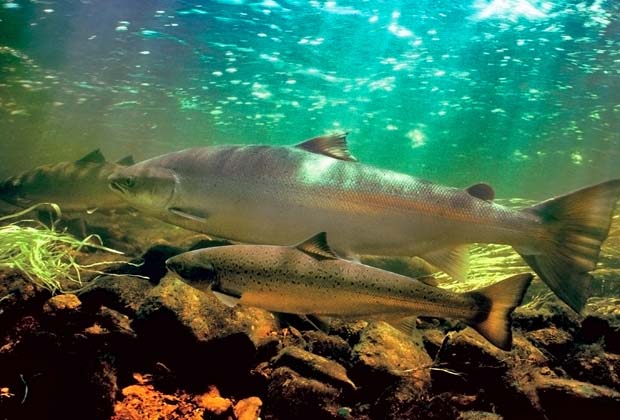Panel believes in collaboration—not regulation—as the best path toward securing a future where fish and wildlife and natural resource-based enterprise thrive
ST. LOUIS, Missouri / October 10, 2014
[dropcap]T[/dropcap]he CEO of a fishing store chain and the former governor of a state home to refuges and national parks announced the roster of a Blue Ribbon Panel for sustainable fishing at the Association of Fish and Wildlife Agencies (AFWA) annual meeting in St. Louis.
Founded and co-chaired by Bass Pro Shops CEO Johnny Morris and former Wyoming Gov. Dave Freudenthal, the national Blue Ribbon Panel on Sustaining America’s Diverse Fish and Wildlife Resources will feature at least 27 members, 20 of whom were announced Sept. 22 at the AFWA meeting.
The additinal panelists and four ex-officio members will be added to the roster before the panel’s first meeting in 2015.
The mission of the panel is to recommend policy options for funding sustainability models.
“Dedicated funding allowing for the management of all fish and wildlife, whether game or non-game species, is essential for this nation,” Missouri Department of Conservation Director and panelist Bob Ziehmer said. “Many species are declining in abundance and will continue to do so if we don’t work toward establishing a sustainable funding source for our nation now and into the future.”
According to AFWA, the 20 people announced to the panel’s roster hail from manufacturers, outdoor recreational retail companies, energy, the automotive industry, educational institutions, conservation organizations, fish and wildlife agencies and sportsmen’s groups.
In seeking a model to fund sustainable programs, the Blue Ribbon Panel aims to prevent “new endangered species listings” but still preserve outdoor recreational lifestyles.
“Conservation means balancing the sustainability of fish and wildlife with the many needs of humans for clean air and water; land; food and fiber; dependable energy; economic development and recreation,” Morris said. “By assembling this panel … we will find a way forward that safeguards not only vital natural resources, but also our nation’s economic prosperity and outdoor heritage.”
According to AFWA, funding for the State and Tribal Grants Program, the only federal mechanism to prevent new endangered species listing, was cut by more than 35 percent since 2010 compared to a 1,000 percent increase in petitions for endangered species listings.
More about the panel can be found online at fishwildlife.org/blueribbonpanel.
“Conservation means balancing the sustainability of fish and wildlife with the many needs of humans for clean air and water; land; food and fiber; dependable energy; economic development and recreation,” said Morris. “By assembling this Panel of highly regarded leaders and problem solvers, we will find a way forward that safeguards not only vital natural resources, but also our nation’s economic prosperity and outdoor heritage.”
“With fish and wildlife species and natural resource-based enterprise at stake, we can’t afford an ‘us vs. them’ mentality,” said Freudenthal. “It is time to create certainty for both industry and the conservation community by building a 21st century funding model.”
State hunting and fishing license dollars, federal excise taxes on hunting and fishing gear and motorboat fuel taxes have provided the backbone for funding states’ fish and wildlife conservation programs over the past century. However, there has always been a significant gap in dedicated funding for conserving the 95 percent of all species that are neither hunted nor fished.
Only partially filling that gap is the State and Tribal Wildlife Grants Program, the sole federal source of funding to state agencies to prevent new endangered species listings. Since 2010, the program’s funding has been cut by more than 35 percent while petitions for federal endangered species listing has skyrocketed by 1,000 percent.
“Dedicated funding allowing for the management of all fish and wildlife, whether game or non-game species, is essential for this nation,” said Bob Ziehmer, Missouri Department of Conservation director and representative for state fish and wildlife agencies on the Blue Ribbon Panel. “Many species are declining in abundance and will continue to do so if we don’t work toward establishing a sustainable funding source for our nation now and into the future.”
The Association of Fish & Wildlife Agencies began its quest to secure sustained funding for fish and wildlife diversity conservation in the early 1990s. The launch of the Teaming With Wildlife coalition, which now includes nearly 6,400 organizations, was a critical step in demonstrating broad and diverse support for dedicated fish and wildlife funding.
The co-chairs expect to add approximately three more individuals and four Ex Officio participants to the Panel before it convenes its first meeting in early 2015.
[information]
To see a full listing of Blue Ribbon panelists, click here . . .
AFWA Staff Contact:
Mark Humpert
202/624-3637
mhumpert@fishwildlife.org
…[/information]



